 |
 |
|
PART EIGHT October 7, 2019 THE FORT OF JOY AND WOE The believers had left the home of Quddús after having happily shared a dinner with Mullá Husayn, who was visiting Bárfurúsh in Mázindarán and who was treated as a greatly esteemed guest. Quddús then asked Mullá Husayn about his visit with the Báb in Máh-Kú. “He told me this”, said Mullá Husayn: “On your way to Tehran, you should visit the believers in every town and village through which you pass. From Tehran you should proceed to Mázíndarán, for there lies a hidden treasure which shall be revealed to you, a treasure which will unveil to your eyes the character of the task you are destined to perform. I gathered from His words”, continued Mullá Husayn, “that I would eventually sacrifice my unworthy self in His path. The Feast of Sacrifice” were His last words to me, ‘is fast approaching. Arise and gird up the loin of endeavour and let nothing detain you from achieving your destiny.”  Quddús asked him if he had brought any of the Báb’s writings, but on hearing that Mullá Husayn had none, asked him if he would be willing to read some pages of a manuscript, to which he agreed. Upon reading them, however, his whole expression changed to one of admiration and surprise and upon being met with silence when asked who the author was, Mullá Husayn realized he had finally met the hidden treasure promised by the Báb. The next morning, the believers were surprised to find that Mullá Husayn, who had occupied the seat of honour the night before, was now behaving as the humble host of a great and esteemed guest. Then Quddús instructed him to go to Mashhad in the province of Khurasán and build the Babíyyih, a centre where the Faith was taught. Once complete, Quddús joined Mullá Husayn and through their combined efforts the Bábí Faith swept over the city and region like a tornado. While Mullá Husayn was in Mashhad, he received a message from the Báb in early July 1848, instructing him to fulfill one of the great prophecies of the Prophet Muhammad – hoisting high the black flags that would announce the advent of the Promised One. He also sent him the gift of a green turban, only worn by descendants of the Prophet Muhammad, and gave him the new name of Siyyid ‘Alí, thereby proclaiming Mullá Husayn’s spiritual greatness. Mullá Husayn and his 202 gathered companions rode through the province of Khurásán towards Quddús, who was then in Bárfurúsh. Mullá Husayn told his companions that they must detach themselves from all things save God and leave everything behind: their families, businesses and their wealth. One merchant even threw a sack of precious turquoise gems worth a fortune into a ditch and never looked back. Physically, however, Mullá Husayn was not a strong man. A student rather than a soldier and further handicapped by a trembling hand which made it difficult for him to write, much less wield a sword, he soon became a fearless leader. Several times he warned his companions about the fierce and inhuman trials awaiting them that twenty Bábís abandoned the group, unable to continue. When Mullá Husayn and his Companions of the Black Standard approached Bárfurúsh, the leading divine there sent a frenzied, frightened mob to intercept and kill them. Although the Báb had instructed His followers that it was forbidden to kill someone for being an unbeliever, Mullá Husayn was faced with the need for self-defense. Six companions were already down among the flying bullets, but his companions did nothing, awaiting a signal for counterattack by their leader. “The number is not yet complete” he replied, not wishing to fan bloodlust, but when he saw the seventh companion, his dear friend Siyyid Rídá dead at his feet, he could wait no more. He unsheathed his sword and upon seeing the man who had shot his friend hiding behind a tree, with a mighty stroke of his sword, he sliced the tree, the man and his musket in two, a feat that amazed one and all and sent the perpetrators to flight. Mullá Husayn and his companions then faced numerous other attacks and intrigue before they finally retreated to the Shrine of Shaykh Tabarsí in Mazindaran. The night before Mullá Husayn and his companions arrived at the shrine, the keeper of that shrine dreamt that the Imam Husayn himself, accompanied by 72 warriors and a large number of followers arrived at the Shrine, then engaged in many battles defending themselves against whole armies and that even the Prophet Muhammad came to the shrine to give them strength. On arrival, the Bábís built a fort around the Shrine of Shaykh Tabarsí as a means of self-defense. They also knew that for most, this would be their last refuge before death sent them soaring toward God. Until then, however, they fought and defended themselves with great bravery and fearlessness. Mullá Husayn had only to tell them “Mount your steeds, O heroes of God!” and they would be transformed into warriors, bringing victory after victory, even when they were fighting the ever-growing army of the new king, Násiri’d Din Sháh, the previous Sháh having passed away not long before. These God-intoxicated men not only defended themselves admirably amid flying bullets and cannonballs, they were often heard singing songs of praise and joy from behind the walls of their fort to the consternation of their enemies.
|
|
|